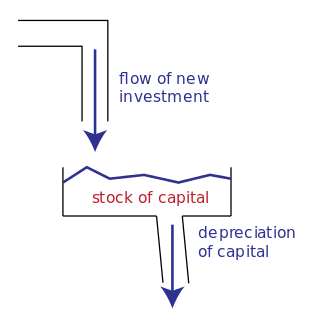
Film stock is an analog medium that is used for recording motion pictures or animation. It is a strip or sheet of transparent plastic film base coated on one side with a gelatin emulsion containing microscopically small light-sensitive silver halide crystals. The sizes and other characteristics of the crystals determine the sensitivity, contrast and resolution of the film. The emulsion will gradually darken if left exposed to light, but the process is too slow and incomplete to be of any practical use. Instead, a very short exposure to the image formed by a camera lens is used to produce only a very slight chemical change, proportional to the amount of light absorbed by each crystal. This creates an invisible latent image in the emulsion, which can be chemically developed into a visible photograph. In addition to visible light, all films are sensitive to X-rays and high-energy particles. Most are at least slightly sensitive to invisible ultraviolet (UV) light. Some special-purpose films are sensitive into the infrared (IR) region of the spectrum.

A stock market, equity market or share market is the aggregation of buyers and sellers of stocks, which represent ownership claims on businesses; these may include securities listed on a public stock exchange, as well as stock that is only traded privately. Examples of the latter include shares of private companies which are sold to investors through equity crowdfunding platforms. Stock exchanges list shares of common equity as well as other security types, e.g. corporate bonds and convertible bonds.

A ticker symbol or stock symbol is an abbreviation used to uniquely identify publicly traded shares of a particular stock on a particular stock market. A stock symbol may consist of letters, numbers or a combination of both. "Ticker symbol" refers to the symbols that were printed on the ticker tape of a ticker tape machine.

The S&P 500, or just the S&P, is an American stock market index based on the market capitalizations of 500 large companies having common stock listed on the NYSE, NASDAQ, or the Cboe BZX Exchange.
Day trading is speculation in securities, specifically buying and selling financial instruments within the same trading day. Strictly, day trading is trading only within a day, such that all positions are closed before the market closes for the trading day. Many traders may not be so strict or may have day trading as one component of an overall strategy. Traders who participate in day trading are called day traders. Traders who trade in this capacity with the motive of profit are therefore speculators. The methods of quick trading contrast with the long-term trades underlying buy and hold and value investing strategies.
In finance, an equity derivative is a class of derivatives whose value is at least partly derived from one or more underlying equity securities. Options and futures are by far the most common equity derivatives, however there are many other types of equity derivatives that are actively traded.
In finance, a growth stock is a stock
of a company that generates substantial and sustainable positive cash flow and whose revenues and earnings are expected to increase at a faster rate than the average company within the same industry. A growth company typically has some sort of competitive advantage that allows it to fend off competitors. Growth stocks usually pay smaller dividends, as the company typically reinvests retained earnings in capital projects.

A blue chip is stock in a corporation with a national reputation for quality, reliability, and the ability to operate profitably in good times and bad. The most popular index that follows United States blue chips is the Dow Jones Industrial Average, a price-weighted average of 30 blue-chip stocks that are generally the leaders in their industry. All companies in the Dow Jones Industrial Average are blue-chips, but the Dow Jones Industrial Average is an index that does not include all companies that are blue chips. Nevertheless, it has been a widely followed indicator of the stock market since October 1, 1928.

A try square is a woodworking or a metalworking tool used for marking and measuring a piece of wood. The square refers to the tool's primary use of measuring the accuracy of a right angle ; to try a surface is to check its straightness or correspondence to an adjoining surface. "Try square" is so called because it is used to "try" the squareness.

Stock is a flavored liquid preparation. It forms the basis of many dishes, particularly soups, stews and sauces. Making stocks involves simmering animal bones or meat, seafood, or vegetables in water or wine, adding mirepoix or other aromatics for more flavor.
Penny stocks, also known as cent stocks in some countries, are common shares of small public companies that trade at low prices per share.

Economics, business, accounting, and related fields often distinguish between quantities that are stocks and those that are flows. These differ in their units of measurement. A stock is measured at one specific time, and represents a quantity existing at that point in time, which may have accumulated in the past. A flow variable is measured over an interval of time. Therefore, a flow would be measured per unit of time. Flow is roughly analogous to rate or speed in this sense.

The secondary market, also called the aftermarket and follow on public offering is the financial market in which previously issued financial instruments such as stock, bonds, options, and futures are bought and sold. Another frequent usage of "secondary market" is to refer to loans which are sold by a mortgage bank to investors such as Fannie Mae and Freddie Mac.
Par value, in finance and accounting, means stated value or face value. From this come the expressions at par, over par and under par.
A gunstock or often simply stock, the back portion of which also known as a shoulder stock, a buttstock or simply a butt, is a part of a long gun that provides structural support, to which the barrelled action and firing mechanism are attached. The stock also provides a means for the shooter to firmly brace the gun and easily aim with stability by being held against the user's shoulder when shooting the gun, and helps to counter muzzle rise by transmitting recoil straight into the shooter's body.

The Athens Exchange is "the operator of the regulated markets, the multilateral trading facilities (MTFs) and carbon market as well as the over the counter market (OTC) in Greece". There are five markets operating in ATHEX: regulated securities market, regulated derivatives market, Alternative market, carbon market and OTC market. In the regulated securities market investors can trade in stocks, bonds, ETFs and other related securities. The term Athens Stock Exchange (ASE) is unofficially used for the stock exchange in ATHEX; this term was used in the past more extensively, a fact that was reflected in the address of the former corresponding website of the exchange.
The S&P/ASX 200 index is a market-capitalization weighted and float-adjusted stock market index of stocks listed on the Australian Securities Exchange. The index is maintained by Standard & Poor's and is considered the benchmark for Australian equity performance. It is based on the 200 largest ASX listed stocks, which together account for about 82% of Australia’s sharemarket capitalisation.

Bump fire is the act of using the recoil of a semi-automatic firearm or revolver to fire shots in rapid succession at the cost of accuracy of individual shots.
Stock assessments provide fisheries managers with the information that is used in the regulation of a fish stock. Biological and fisheries data are collected in a stock assessment.











